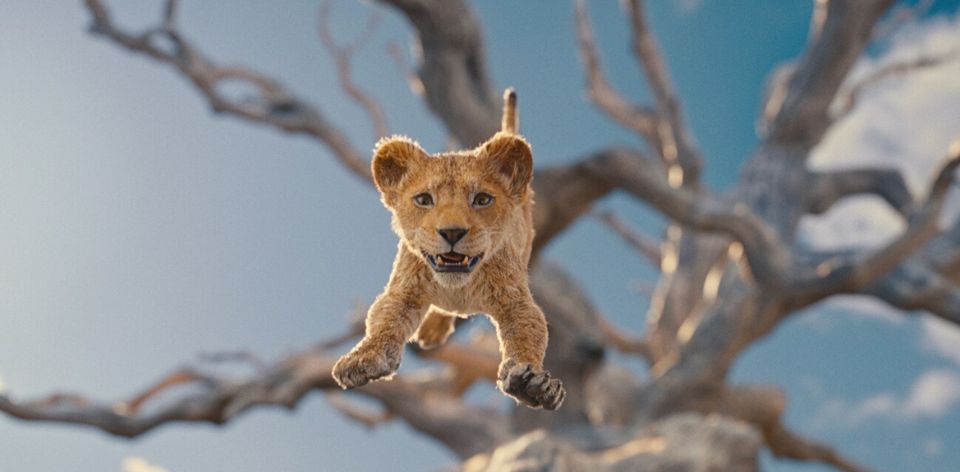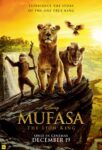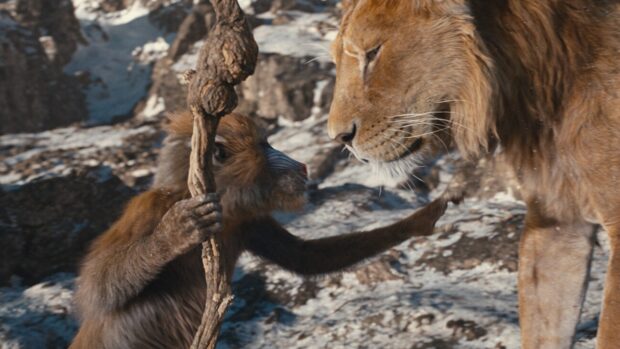In the thirty years since the animated classic The Lion King, the story has become an industry unto itself. Spawning direct-to-home spin-offs, a goliath Broadway musical adaptation, several animated series and a photorealistic remake, it’s hard to imagine what new ground there’s left to cover in the Pride Lands.
MUFASA: THE LION KING serves as both a sequel and a prequel to the 2019 remake. Through a framing device, shaman Rafiki (voiced by John Kani) – along with Timon (Billy Eichner) and Pumbaa (Set Rogen) – recounts to Simba and Nala’s daughter Kiara (Blue Ivy Carter) the tale of two young lion cubs. One is Mufasa (Aaron Pierre), destined to become the King of the Pride Lands. The other is his adopted brother Taka (Kelvin Harrison Jr.), who will eventually be known as Scar.
Disney sequels have become a cornerstone of modern event cinema, but there are two reasons to pay particular attention to this one. The first is the new music by Lin-Manuel Miranda, beloved for his Disney soundtracks to Moana and Encanto. The second is the director: Barry Jenkins, the award-winning filmmaker behind Moonlight and If Beale Street Could Talk.
While the familiar strains of Lebo M’s choir invite us back to Pride Rock, Jenkins sets MUFASA apart as an adventure film first and a musical second. The core narrative is more traditional Disney fare, focusing on “childhood trauma” (as Timon cheekily puts it), parental loss, and finding one’s place in the world. In many ways, Mufasa’s story echoes Simba’s journey, reimagining him as the outcast who finds a family among a ragtag group before embracing his destiny in the Circle of Life. A pride of white lions led by Kiros (Mads Mikkelsen) steps in for the hyenas, while Sarabi (Tiffany Boone) takes on a role reminiscent of Nala.
The songs, though fewer in number, are all hits. Miranda weaves his trademark lyrical flair into Lebo M’s powerful soundscape, especially in the upbeat “I Always Wanted a Brother,” a playful counterpart to “I Just Can’t Wait to Be King.” The heartfelt duet “Tell Me It’s You,” performed by Aaron Pierre and Tiffany Boone, may finally earn Miranda the Oscar that “Can You Feel the Love Tonight?” secured for Elton John and Tim Rice.
Jenkins’ influence is most apparent in the nuanced vocal performances. Pierre, who previously collaborated with Jenkins on The Underground Railroad, shines as a charismatic lead—a challenging feat given the shadow of James Earl Jones, whose iconic portrayal receives a heartfelt tribute before the opening credits.
However, the emotional depth of the characters struggles to come through without the expressiveness of traditional animation. On a technical level, Disney’s photorealistic animation continues to set new standards, capturing every strand of fur and background detail. It’s a visual marvel, directly linked to Walt Disney’s enduring pursuit of realism. Yet there’s a reason animation embraced stylised designs and anthropomorphism, as those choices allow for greater emotional connection and storytelling flexibility.
MUFASA: THE LION KING proves to be a stronger prequel than anticipated, blending elements of the original Lion King and Simba’s Pride with vibrant new songs. The rousing finale undeniably sticks the landing, but the film remains constrained by too much retread and not enough heart.
2024 | USA | DIRECTOR: Barry Jenkins | WRITERS: Jeff Nathanson | CAST: Aaron Pierre, Kelvin Harrison Jr., Seth Rogen, Billy Eichner, Tiffany Boone, Donald Glover, Mads Mikkelsen, Thandiwe Newton, Lennie James, Anika Noni Rose, Blue Ivy Carter, Beyoncé Knowles-Carter | DISTRIBUTOR: Disney | RUNNING TIME: 118 minutes | RELEASE DATE: 18 December 2024 (Australia), 20 December 2024 (USA)






